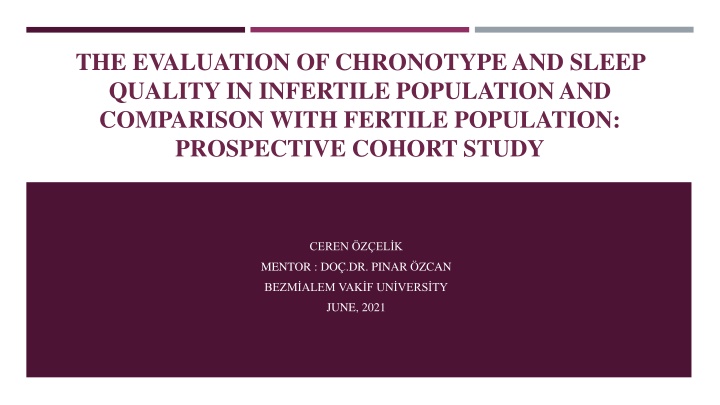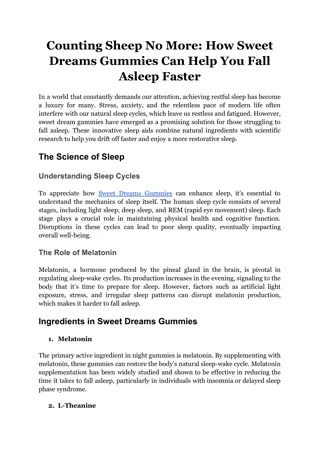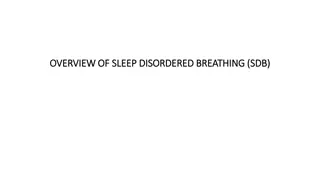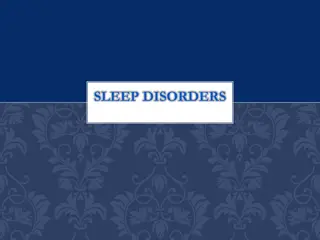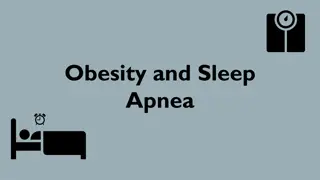Evaluation of Chronotype and Sleep Quality in Infertile Population
This prospective cohort study, led by Ceren Zelk with mentor Dr. Pinar Ozcan Bezmi Alem, aims to assess the chronotype and sleep quality in infertile population compared to fertile population. The research explores the impact of these factors on infertility, considering the circadian rhythm's influence on various bodily processes. By examining the relationship between chronotype, sleep quality, and fertility, the study addresses an existing gap in understanding the potential effects on reproductive health.
Download Presentation

Please find below an Image/Link to download the presentation.
The content on the website is provided AS IS for your information and personal use only. It may not be sold, licensed, or shared on other websites without obtaining consent from the author.If you encounter any issues during the download, it is possible that the publisher has removed the file from their server.
You are allowed to download the files provided on this website for personal or commercial use, subject to the condition that they are used lawfully. All files are the property of their respective owners.
The content on the website is provided AS IS for your information and personal use only. It may not be sold, licensed, or shared on other websites without obtaining consent from the author.
E N D
Presentation Transcript
THE EVALUATION OF CHRONOTYPE AND SLEEP QUALITY IN INFERTILE POPULATION AND COMPARISON WITH FERTILE POPULATION: PROSPECTIVE COHORT STUDY CEREN Z EL K MENTOR : DO .DR. PINAR ZCAN BEZM ALEM VAK F UN VERS TY JUNE, 2021
PLAN Circadian Rhythm Chronotype Aim and Importance of Research Material and method Result Conclusion References
All photosensitive organisms have a circadian rhythm. This rhythm is one of the primary identifiers of the sleep-wake cycle and it can affect many endojens and exogens factors.
THE CIRCADIAN RHYTHM IS known to influence cholesterol synthesis pathways, which precede sex steroid hormone productions regulated primarily by the suprachiasmatic nucleus which has sex steroid hormone receptors melatonin hormone released from the pineal gland. It can help regulate oxidative stress in the ovaries and the synthesis of the gonadotropins
ALSOTHE CIRCADIAN RHYTHM DEFINESTHE CHRONOTYPE Chronotype affects the physically and cognitively active part of the day. There are three main chronotypes based on circadian rhythm Morning type Intermediate type Evening type
AIM How is the chronotype profile in infertil population? How is the sleep quality in the infertil population? May be there any potential effect of these two conditions on infertility? Is there a difference chronotype profile and sleep quality between infertil and fertile populations?
IMPORTANCE OF RESEARCH There are some studies evaluating the relationship of chronotype with ovarian cycle, menstrual pain, duration of menstruation, preeclampsia and preterm birth, BUT There is no data to evaluate chronotype and sleep quality in the infertile population and also to compare these conditions with fertile population. Therefore, we don t know the effect of chronotype and sleep quality on infertility.
MATERIALAND METHOD Participants: Women between the ages of 18-40 Infertile group: women that can not get pregnancy within 1year despite reguler and unprotected sexual intercourse attending to the division of Reproductive Endocrinology and Infertility (n=110) Control group: women that have spontaneous pregnancies attending to Gynecology Department of Bezmialem University Hospital (117) Demographic characteristics: Age, gravida, parity, BMI, smoking, job, infertility time, infertility type
Inclusion criteria : Exclusion criteria : 18-40 years old women 3rd day FSH<12 mIU/ml With tubal, unexplained, intermediate-stage endometriosis Mild-moderate male factor Willingness for participation Mental or neurologic disorders Sleep disorders Use drugs that affect the sleep-wake cycle Non-willingness for participation
Score 16-41 42-58 59-86 Chronotype Eveningness Intermedaite Morningness
Pittsburgh Sleep Quality Index(PSQI): 1.Subjective Sleep Quality 2.Sleep Latency 3.Sleep Duration 4.Habitual Sleep Efficiency 5.Sleep Disturbance 6.Utilization of Sleep Medication 7.Daytime Dysfunction Score <5 >5 Sleep Quality Good Bad
Statistical Analysis: The data were presented as frequencies with percentages and median (minimum-maximum). Analyses were done by chi-square test, Fisher Freeman Halton test, Mann Whitney U test, Kruskal Wallis test and Spearman Correlation Coefficient. Level of significance were taken =0.05. SPSS 25 (IBM Corp. Released 2017. IBM SPSS Statistics for Windows, Version 25.0. Armonk, NY: IBM Corp.) software were used for analyses.
RESULTS Demographic characteristics of group Infertile Group Control Group Characteristics (n = 110) (n =117) P 32.00 (24.00 - 40.00) 32.00 (21.00 - 40.00) Age(years) NS 0.00 (0.00 - 4.00) 2.00 (1.00 - 5.00) Gravida <0.001 0.00 (0.00 - 2.00) 2.00 (1.00 - 5.00) Parity <0.001 25.00 (17.00-38.00) 24.00 (17.00 - 38.00) BMI (kg/m ) NS 3.00 (0.50 - 19.00) Infertility Time Infertility Type 68.2% Primary Infertile 31.8% Secondary Infertile 50.9% 49.1% Smokers 46.2% 53.8% Nonsmokers Job NS Housewife 42.7% 38.5% 55.5% 61.5% Officer Shift Worker 1.8% 0.0% Values are reported as median(min-max), percentage p<0.05, statistically significant difference p>0.05 is statistically not significant (NS)
Comparison of MEQ and PSQI scores of groups Characteristics Infertil Group Control Group P MEQ Group <0.001 14.5% 39.3% Morningness 61.8% 59.8% Intermediate 23.6% 0.9% Eveningness 50.00 (25.00 - 73.00) 56.00 (34.00 - 77.00) MEQ Score <0.001 PSQI Group <0.001 27.3% 78.6% < 5 72.7% 21.4% > 5 5.00 (1.00 - 12.00) 4.00 (1.00 - 9.00) PSQI Score <0.001 PSQI Subgroups 1.00 (0.00 - 3.00) 1.00 (0.00 - 3.00) Subjective Sleep Quality NS 2.00 (0.00 - 3.00) 1.00 (0.00 - 3.00) Sleep Latency <0.001 0.00 (0.00 - 3.00) 0.00 (0.00 - 3.00) Sleep Duration <0.01 0.00 (0.00 - 1.00) 0.00 (0.00 - 0.00) Sleep Efficiency <0.01 1.00 (1.00 - 2.00) 1.00 (0.00 - 2.00) Sleep Disturbances NS 0.00 (0.00 - 1.00) 0.00 (0.00 - 1.00) Use of Sleep Medication NS 0.00 (0.00 - 5.00) 0.00 (0.00 - 3.00) Daytime Disfunction NS Values are reported as median(min-max), percentage p<0.05, statistically significant difference p>0.05 is statistically not significant (NS)
CONCLUSION This is the first study to assess the associations between sleep disturbances and chronotypes with infertility. The result showed that poor sleep quality with a high PSQI score and evening-type with a low MEQ score are associated with infertility.
THANK YOU THANK YOU
